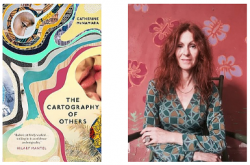Catherine McNamara’s reading of The Cartography of Others in Rome
 Earlier this week, I went to the Otherwise bookstore in Rome to see Italy-based Australian author Catherine McNamara read from her new short story collection entitled The Cartography of Others.
Earlier this week, I went to the Otherwise bookstore in Rome to see Italy-based Australian author Catherine McNamara read from her new short story collection entitled The Cartography of Others.
I met Catherine some years ago, and I’ve already blogged about her work. You can see my earlier post about her last collection, Pelt and Other Stories . I also did an author interview with her about her first novel and her writing process.
But this is the first time I attended one of her readings, and I enjoyed hearing her read from her stories.
Here’s the publisher’s background about the collection:
A Japanese soprano sets sail for arid, haunted Corsica where she seeks her lost voice. A nude woman at the window of a Hong Kong hotel watches her lover dine in an adjacent building, but is her desire faltering? With a young son and her photographer partner, a journalist traverses Mali to interview an irascible musician. A son relives his mother’s last hours before a hiking accident in the Italian Dolomites, while in London a grieving family takes in an ex-soldier from the Balkan wars, unaware of the man’s demons.
The Cartography Of Others takes us from fumy Accra to suburban Sydney, from scruffy Paris to pre-fundamentalist Mali. Each bewitchingly recounted story conveys a location as vital as the fitful, contemplative characters themselves. Lives are mapped, unpicked and crafted, across vivid lingering terrains.
I look forward to reading the collection. At the reading, Catherine expanded on her collection, noting that the themes tying the stories together are arrivals and departures and a sense of alienation and misunderstanding for those who live and travel elsewhere. She is also interested in dishonesty and the multiple layers buried under the personal narratives of her characters.
She also spoke a lot about short story writing, and the differences between novels and short stories. Contrary to common belief, Catherine pointed out that short stories are not easier to write than novels, and that those readers who do not enjoy short stories often complain that they lack the same sense of satisfaction one feels when he or she reads a novel, with its clear point of beginning, developing plot arch and satisfying resolution. Short stories only examine a sliver of time, and they are often defined more by what they do not reveal than by what they do.
I enjoyed Catherine’s reading and look forward to reading her latest collection.